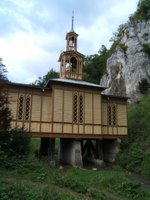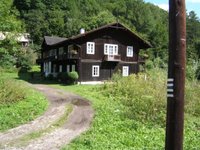Poland - part 3

A few notes on the Polish language: it might be fair to describe it as “Russian lite”, since it’s much softer sounding. Indeed the two languages are related, and I had the opportunity to hear them side by side. Compared to Polish, Russians sound like they’re freaking out. By that I mean Russians speak more insistently, as though eager to get their point across. Whether they actually are or not is another question.
We couldn’t help noticing so many words ending in “y”, which reminded me of Hungarian. It took a few days, but I finally figured out that “y” added to a noun makes it plural, hence billety (tickets), zloty (units of currency), planty, farby and all the rest. Don’t ask me to pronounce it though -- that’s not my forte. My forte is figuring out what words mean, whereas Lisa can pronounce them; together we made it work.
Our plan was to use Cracow as a base for exploring other points of interest, many of which were right there in the state of Malopolska (“Little Poland”). Lisa wanted to witness the Marian feast in Czestochowa, home of the famous “Black Madonna” icon, which annually attracts hundreds of thousands of faithful Catholic pilgrims. I wanted to explore the Cracow-Czestochowa Upland, the scenic corridor between the two cities, known for its limestone formations, castles, and ruins of castles. The seemingly logical plan was to spend the night near Ojcow National Park, then proceed to Czestochowa.
After checking out of the Hotel Regent, we took out money and trekked over to the bus station, heavy packs and all. To get to the bus station you had to pass through the train station, and there were heavy streams of travelers flowing in every direction. Lisa assured me that in Polish culture, if you accidentally slam into someone, it’s not only no big deal but completely normal. That was good to know since I’m always bumping into people in whatever culture I happen to find myself.
It was a day of close calls. We just barely made the complimentary breakfast at the hotel, and then we figured out what bus to take about a minute before it pilled out of the station. Once on the tightly packed bus we could relax a little and enjoy the scenery. The outer suburban ring around Cracow could have been anywhere in Western Europe or America. There were stations selling gas for over four zloty a liter (approximately $1.60), Kentucky Fried Chicken, and a huge Ikea. I remember hearing about Ikea in Poland, and at the time it was an exotic concept, but now that we were driving by it I realized it was as completely normal as Ikea in Hicksville or Huntington Beach.
The countryside felt more European, with the occasional castle appearing on the rolling hills. Also very European was the way all vehicles were flying down the narrow, perfectly paved freeway at top speed. I wondered how the roads here were in such good condition – none of the American style potholes one might expect in freezing cold Poland. Was it socialism at work? The novelty of capitalism? Or good old European know-how? One thing was clear – any notion I may have had about Poland being a backward country was jettisoned out the window that day. The evidence of my senses suggested that Poland had completely integrated into the European Union.
What a contrast to my visit to Budapest in 1985. Then, there was this dreary east-bloc pall hanging over everything, a palpable sense of constriction that made that otherwise picturesque city feel a little sad. A slightly different but no less bleak atmosphere greeted Richard and I when we wandered around East Berlin around the same time. But this Poland of 2006 was a different animal. Maybe the sunny sky and all the accompanying color affected my impression. But looking at the people around me, the sense I got was that they were mostly young and healthy and happy, and that the society on the whole was young and undergoing a dynamic period of growth. I’d heard about the “Polish economic miracle”, but it was interesting to experience it firsthand.
Not being sure where the main stop for Ojcow National Park was, I went to the front of the bus and asked the driver to let us know. He gestured to the effect that it was at the bottom of the hill. The road then went from being completely surrounded by fields to being completely surrounded by forest, with no transition. I knew we were in the park, and signaled Lisa to get ready. As it turned out, most people on the bus were going to Ojcow, which is one of Poland’s smaller National Parks but very well used, being just outside the city.
There was a funny green wooden building inside of which a man was selling something. A British woman and her daughter were holding a Lonely Planet guide, the universal sign of English speakers. Unfortunately, apart from a few pleasantries, they were unable to help me make heads or tails of how to proceed. While I wondered if we were expected to pay an entrance fee, I noticed that people were lining up to buy the park map, which I realized would be a good thing to have. It proved very useful indeed.
The ongoing struggle of the trip was finding a place to stay every night. Lonely Planet listed a hostel inside the park, and we lost no time hiking the shady, leafy trail that led to it. I found the hiking pleasant and invigorating, but unfortunately Lisa bitched about what a pain it was. When we got to the hostel, a woman who knew no English seemed to be telling us there were no rooms. So we proceeded to plan B.
We hiked back to the center of Ojcow and passed a beautiful old hotel, wondered why the guide didn’t list it -- if it was even open, had vacancies or was affordable. Maybe we should have asked, but instead we followed Lonely Planet’s advice and inquired elsewhere about a room for the night. The building we were directed to was perfectly charming on the outside, but the inside was another story. We suddenly found ourselves straining to communicate with the proprietor, a friendly woman who showed us a room and charged us roughly $6 US. She also seemed to say that American visitors are rare in these parts. The room turned out to be a real “you get what you pay for” type deal, but we were desperate to find something and pleased at the price.

Relieved of our backpacks, we stepped out into the sunny park. First we checked out the “town”, which consisted of one “road” that was mainly used by walkers and bicyclists, and a smattering of homes, restaurants, and other buildings. We walked to the south end and decided to have a beer at a pleasant outdoor café. The beer was indeed pleasant, after which we wandered back to the north end. Right behind the bus stop were the ruins of some aristocrat’s castle perched on a limestone cliff. We hiked to the top, where we were asked to pay a small fee. Then, after passing under a stately tower, we entered another tower that featured a display about the deceased aristocrats. That was fine, even if it was all in Polish. But the rest of the ruin was disappointing, because it was no more than footprint. Plus, hiking with beer in my system makes me cranky. While I enjoy a good beer, as a rule it makes me sleepy.
Back in the “town” we found a good restaurant with an outdoor table and a view of a little dog barking at some goats. We noticed that Poland was full of little “yapper” dogs. It was also full of smokers, which was the only problem with our outdoor table. Otherwise, the coffee was excellent, the pierogis perfect, and the purple pickled cabbage out of this world.
After dinner we went for a stroll along the main road, which was surprisingly delightful. There was a meadow bursting with wildflowers that may have been weeds – I don’t know what’s native here – and noisy cicada-like insects. Then, built directly over a stream, a beautiful wooden chapel in shades of ochre. A little bit further was a roadside shrine to the Virgin Mary carved directly into a wall of limestone, full of candles and flowers. The general flavor of the place was a lot like rural Austria. Then, at an outdoor café, we saw a cat, which was notable because although Poland was full of little yapper dogs, we saw very few cats. Before turning around we crossed a bridge, and encountered a troop of youths clad in black and green -- scouts or soldiers or something in between.
Back at Ojcow we bought some ice cream pops. We ate them slowly on a bench, and I studied the wrapper, which listed the ingredients in at least five languages -- languages like Czech and Hungarian and Lithuanian. All at the same time, the light began to slip away, drops of rain began to appear, and a deep tiredness came over us. We decided to retire to our room of questionable cleanliness.
The room was indeed dingy, but the hope was that tiredness would override that detail. And initially it did. As I sat half asleep by the open window, it began pouring torrentially outside, and I was glad we had this room (as opposed to sleeping outdoors in the mud). Before long I was fully asleep on the bed of questionable cleanliness.
Lord knows how many hours passed, but when I awoke I found myself in a state of sensory deprivation, and had no idea where I was. No crickets, no birds, and no light – it was terrifying. Then I remembered that I was in the strange room of questionable cleanliness, and that prevented me from going back to sleep. Instead I lay awake thinking about radio towers. There’s a certain kind of futuristic radio tower that I’d seen in the distance in Cracow. For some reason this kind of radio tower is found in countries like France, Canada, Japan, and South Africa, but to my knowledge not in the US. As I pondered that question, it occurred to me that in places where there are no mountains to place radio transmitters, very tall, artificial structures must be built. And then it dawned on me that most of the great American skyscrapers – the Empire State Building, the Twin Towers, and so forth – were also radio towers.
As I continued to reflect on the history of radio broadcasting, of which New York City was a major center, light started to fill up the dingy room. I knew it was going to be a long time before my next proper night of sleep.


0 Comments:
Post a Comment
<< Home